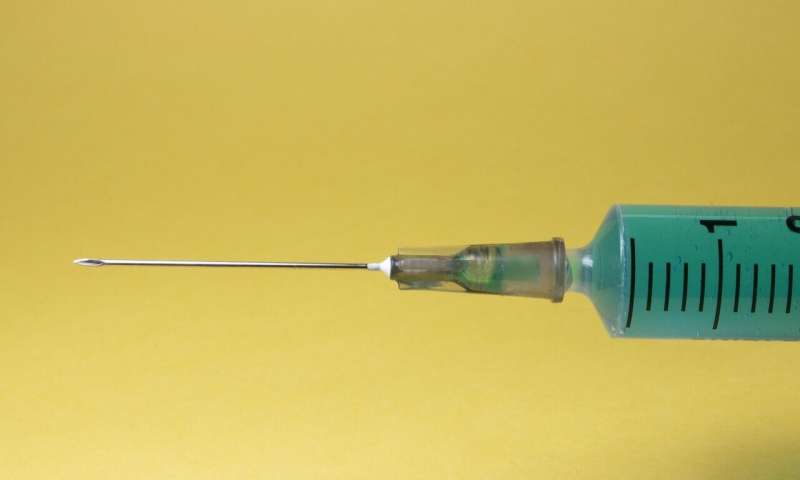December 11, 2023 feature
This article has been reviewed according to Science X's editorial process and policies. Editors have highlighted the following attributes while ensuring the content's credibility:
fact-checked
peer-reviewed publication
trusted source
proofread
Experimental vaccine appears promising as a preventive of a rare HPV-linked cancer

An experimental vaccine against human papillomavirus—HPV—appears to be safe, and most importantly, benefits patients who develop a rare airway cancer that manifests as recurrent obstructive growths requiring dozens, sometimes, hundreds of surgeries over a lifetime to keep the tumors at bay.
The tiny phase 1 clinical study of only 15 patients has served as a proof of concept, demonstrating that recurrent respiratory papillomatosis, a cancerous disorder of the upper airways, can respond to therapeutic vaccination. The tumors are caused by either type 6 or type 11 human papillomavirus.
Writing in Science Translational Medicine, scientists at the Center for Immune-Oncology, a division of the U.S. National Cancer Institute in Bethesda, Maryland, tackled the problem of recurrent respiratory papillomatosis by testing a vaccine strategy designed to prevent tumor development. Dr. Scott M. Norberg, lead author of the research, writes that the evolving approach is aimed at providing a pathway for the prevention of a condition for which there is no cure.
"Recurrent respiratory papillomatosis, RRP, is a rare, debilitating neoplastic disorder caused by chronic infection with human papillomavirus type 6 or 11 and characterized by the growth of papillomas in the upper aerodigestive tract," Norberg writes in the journal. "There is no approved medical therapy, and patients require repeated debulking procedures to maintain voice and airway function."
Norberg added that some people with chronic HPV infection who develop RRP require a mind-boggling number of surgical procedures to maintain near-normal voice and respiratory function. "Patients often require dozens to hundreds of procedures during their lifetime. Unlike other HPV-associated cancers, papillomatous lesions from patients with RRP lack driver mutations, implicating HPV-associated cellular dysfunction as the primary cause of RRP," Norberg noted.
While phase 1 trials are usually seen as a preliminary step before more rigorous clinical testing, this trial's early testing is important because results suggest that therapeutic vaccination can bolster the immune system's defenses against RRP. The finding is seen as a ray of hope for patients and oncologists who have no treatment options other than multiple invasive procedures.
Most people are familiar with HPV as the infamous cause of cervical cancer, but chronic infections caused by HPV 6 or HPV 11 can lead to RRP, which is marked by wart-like growths in the upper airways. The only recourse for patients is repeated surgeries that remove the growths but can't address the underlying biology leading to their occurrence. Doctors have been calling for a less invasive method to treat affected patients; now, scientists may be on track with an approach to prevent the cancers altogether.
"Therapeutic vaccination can result in the development of antigen-directed T cell responses and clinical activity in virally driven disorders," Norberg noted, referring to the hypothesis that he and his colleagues maintained going into the research. He added that the "use of nonhuman adenoviral vaccine platforms with a large genetic payload capacity allows the development of T cell responses to multiple antigen targets."
In the trial, Norberg and collaborators tested a therapeutic vaccine that used a gorilla adenovirus vector. The deactivated adenovirus ferried the vaccine payload into the 15 participants' cells. The team administered different doses of the vaccine—PRGN-2012—to each participant who had, over the years developed severe papillomas that failed to respond to previous treatments.
The study found that the patients tolerated the vaccine well, experiencing only a few mild side effects. Half the group treated with the highest dose showed complete responses, defined as not needing any surgeries the year after treatment. The analyses suggested that the vaccine worked by expanding peripheral HPV-specific T cells.
"To assess clinical response to PRGN-2012, the number of clinically indicated interventions in the 12 months after the study treatment was compared with the number of clinically indicated interventions in the 12 months before the study treatment," Norberg wrote. "Using each patient as their own control for baseline procedural frequency is necessary because of heterogeneity in disease severity between patients and allows for standardized assessment of clinical activity."
Therapeutic vaccination with PRGN-2012 resulted in a clinical benefit in half of the patients, and the response was linked with a tumor microenvironment that could promote HPV-specific T-cell responses, the team found. Given that this was a phase 1 trial, the resulting data suggest a benefit for patients. Therefore, further clinical development of PRGN-2012 for patients with RRP is warranted, Norberg and colleagues concluded.
More information: Scott M. Norberg et al, The tumor microenvironment state associates with response to HPV therapeutic vaccination in patients with respiratory papillomatosis, Science Translational Medicine (2023). DOI: 10.1126/scitranslmed.adj0740
© 2023 Science X Network


















